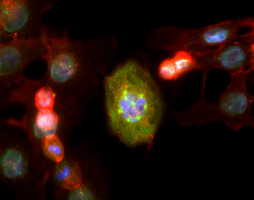
Targeted alpha therapy (TAT) using astatine-211 (211At), an alpha-emitting radionuclide, has gathered much attention as a next-generation cancer treatment that offers high selectivity and minimal side effects.In Japan, a domestic production system for 211At has been established, accelerating the development of 211At -labelled therapeutic agents for clinical application.
We have developed an 211At-labelled RGD peptide that has high affinity for αvβ3 integrin expressed on the surface of cancer cells. In tumour-bearing model mice, we confirmed that 211At-labelled RGD peptide exhibits high tumour accumulation and significant tumour growth inhibition. In this study, we focused on the potential of combining 211At-labelled RGD peptide therapy with immunotherapy to enhance its therapeutic efficacy.
We evaluated the therapeutic efficacy of combination therapeutic efficacy with 211At-labelled RGD peptide and an immune checkpoint inhibitor (anti-CTLA-4 antibody, αCTLA-4) using tumour-bearing mice. The results showed that the combination therapy significantly enhanced tumour growth inhibition and prolonged survival compared to each monotherapy. Furthermore, even with an 211At-labelled RGD peptide monotherapy, increased infiltration of immune cells, such as T cells, into the tumour tissue was observed, indicating that an anti-tumour immune response was induced. These findings suggest the potential of a synergistic treatment strategy that enhances therapeutic efficacy through anticancer immunity by combining 211At-labelled RGD peptide with immune checkpoint blockade.
These findings demonstrate the potential of a novel cancer therapy that combines TAT by 211At with immunotherapy. Further research is expected to focus on elucidating the detailed mechanisms of antitumor immune response and expanding preclinical studies.
Source: Kanazawa University
The World Cancer Declaration recognises that to make major reductions in premature deaths, innovative education and training opportunities for healthcare workers in all disciplines of cancer control need to improve significantly.
ecancer plays a critical part in improving access to education for medical professionals.
Every day we help doctors, nurses, patients and their advocates to further their knowledge and improve the quality of care. Please make a donation to support our ongoing work.
Thank you for your support.